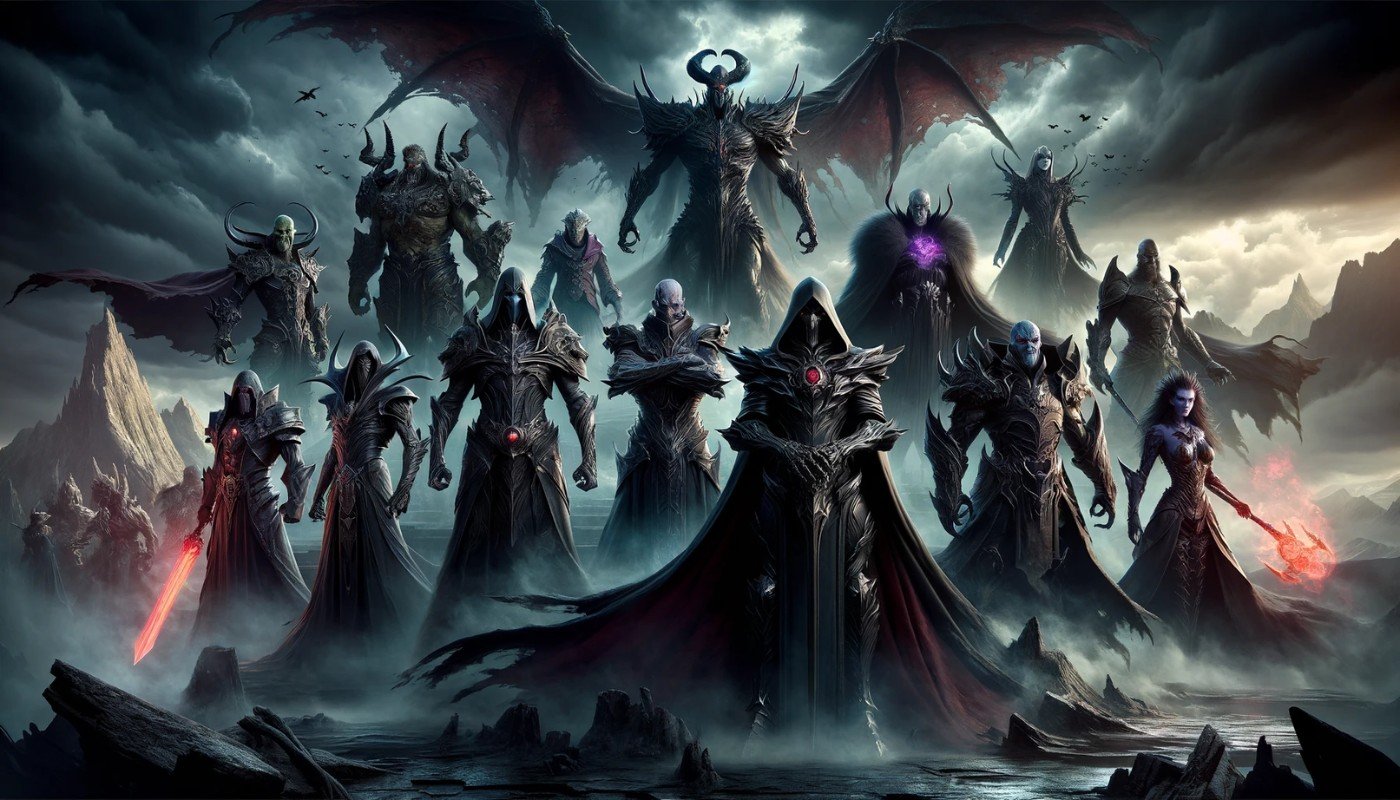Welcome to the shadowy corridors of nomenclature, where the chilling whispers of infamy echo through the halls. In this blog post, we delve into the abyss to unveil the Top 1200 Evil Names that have haunted tales of lore and struck fear into the hearts of many. These sinister monikers are not just a collection; they are a carefully curated lexicon of dread, perfect for writers seeking the ultimate antagonist, gamers crafting nefarious avatars, or anyone intrigued by the darker side of naming. So, steel your nerves and prepare to explore the malevolent depths of names that embody the essence of evil itself. Whether you’re looking for inspiration or just a brush with the dark side, you’ve come to the right place.
A

- Aamon: Often associated with demonic hierarchy, Aamon is a demon and the Grand Marquis of Hell.
- Abaddon: In the Bible, Abaddon is described as the “Destroyer” and is the angel of the abyss.
- Abatu: An earth demon known to bring destruction and terrify humans.
- Abigor: A demon who commands sixty legions of devils in Hell’s hierarchy.
- Abraxas: An ancient figure, Abraxas is often associated with the amalgamation of both good and evil forces.
- Abyzou: Originating from Jewish mythology, Abyzou is a female demon blamed for miscarriages and infant mortality.
- Adramelech: According to Assyrian legend, Adramelech is a sun god who was later demonized.
- Aeshma: In Zoroastrianism, Aeshma is one of the seven arch-demons and the personification of wrath.
- Agares: In demonology, Agares is a fallen angel who now serves as a grand duke in hell.
- Agramon: A demon of fear, Agramon brings panic and terror wherever he goes.
- Ahpuch: A Mayan deity, Ahpuch is the god of death and disaster.
- Ahriman: The Zoroastrian spirit of evil and chaos, Ahriman is the eternal opponent of Ahura Mazda, the spirit of good.
- Alastor: Known as the “Executioner,” Alastor is a demon associated with family feuds and avenging wrongs.
- Alloces: A knight of hell, Alloces commands thirty-six legions of demons and is known for teaching sciences and the liberal arts.
- Amducious: A demon of hell who commands legions and is associated with the sound of music.
- Amon: A powerful demon in demonology, Amon is the Prince of Hell with the power to foretell the future.
- Amy: A demon who is a president in hell, known for teaching secrets and providing good familiars.
- Andras: A demon of discord, Andras sows chaos and has the power to kill at the command of his summoner.
- Andrealphus: A demon who is known for his ability to transform humans into birds.
- Andromalius: A demon who specializes in avenging individuals and discovering hidden treasures or thieves.
- Angra Mainyu: In Zoroastrianism, Angra Mainyu is the destructive spirit and the main adversary to Ahura Mazda.
- Anomylech: A demon whose name means “bringer of bad news.”
- Ansitif: A lesser-known demon who is believed to be involved in possession and was mentioned in the Loudun possessions in the 17th century.
- Aosoth: A dark female demon from the pantheon of Order of the Nine Angles in modern satanic and left-hand path occult traditions.
- Apollyon: In the New Testament Book of Revelation, Apollyon is another name for Abaddon, an angel of the abyss whose name means “Destroyer.”
- Armaros: One of the fallen angels in the Book of Enoch who taught humans the resolution of enchantments.
- Asag: A demon from Sumerian mythology who causes sickness.
- Asaia: A rarely mentioned demon with few known details about his influences and powers.
- Asmodeus: A king of demons, Asmodeus is often associated with lust and is one of the seven princes of Hell.
- Astaroth: A Crowned Prince of Hell, Astaroth is a demon of laziness, vanity, and rationalized sins.
- Azazel: In some traditions, Azazel is a fallen angel who taught humanity to make weapons and cosmetics, leading to sin.
- Azidahaka: A demon or evil figure in Zoroastrianism who embodies evil intentions.
- Azmodei: Another name for Asmodeus, the demon of lust and one of the seven princes of Hell.
B

- Baalzebub: A variation of Beelzebub, often known as the ‘Lord of the Flies’ and associated with one of the seven princes of Hell.
- Bane: A name that signifies a source of harm or ruin, often used for a nemesis or powerful enemy.
- Banshee: Stemming from Irish folklore, a banshee is a female spirit whose wail is believed to foretell death.
- Barbas: In demonology, Barbas is a demon associated with the power of discovery and mechanical arts.
- Bardolph: A name that can be associated with a Shakespearean character known for his red nose; in a darker sense, it could suggest a deceitful or treacherous individual.
- Bathory: Inspired by Countess Elizabeth Báthory, known for her cruelty and alleged to have bathed in the blood of virgins.
- Beelzebub: Another name for the devil, traditionally known as the ‘Lord of the Flies’ and a high-ranking demon.
- Belial: A term from the Hebrew Bible which later became personified as a demon representing lawlessness and worthlessness.
- Belladonna: Literally “beautiful lady” in Italian, this name is also that of a deadly nightshade plant, associated with both beauty and poison.
- Berger: While typically a surname meaning ‘shepherd’, it can evoke a sinister twist as a ‘shepherd of the damned’.
- Berith: In demonology, Berith is the Great Duke of Hell, deceitful and powerful, and often associated with the color red.
- Bifrons: A demon mentioned in grimoires, Bifrons is known for teaching mathematical arts and moving corpses.
- Blackheart: A name that implies a heart devoid of compassion or goodness, often used for a character with malevolent intentions.
- Blackwood: Conjures images of dark, foreboding forests and can be associated with mystery and danger.
- Blight: A name that suggests decay and destruction, often associated with a plague or scourge.
- Bloodworth: Implies a lineage or heritage steeped in bloodshed or a character who values bloodshed.
- Borgia: A surname of a notorious family from Renaissance Italy, synonymous with intrigue, poison, and corruption.
- Brack: A short and harsh-sounding name that could be associated with someone who is severe or unyielding in their evil.
- Brimstone: Refers to sulfur and evokes the fire and brimstone associated with eternal damnation.
- Brom: A short, brooding name that could be associated with a dark, imposing figure.
- Brone: Sounds like “brawn,” suggesting a character whose sheer physical power is intimidating and possibly malevolent.
- Brutus: Known for betraying Julius Caesar, the name is synonymous with treachery and betrayal.
- Bysshe: An unusual name that may evoke a sense of the abyss, darkness, or a mysterious void.
- Balrog: A fearsome creature from J.R.R. Tolkien’s Middle-earth, associated with fire, shadow, and terror.
- Balzor: An invented name that sounds harsh and could be fitting for a character of great malice and strength.
- Baphomet: A symbolic figure with roots in occultism and mysticism, often associated with the Knights Templar and later with satanic cults.
- Barbatos: A name taken from demonology, Barbatos is an Earl and Duke of Hell who understands the voices of animals.
- Basalisk: A twist on ‘basilisk’, a legendary reptile reputed to be a serpent king who can cause death with a single glance.
- Batibat: Originating from Ilocano folklore, a Batibat is a vengeful demon that causes nightmares and can suffocate humans.
- Beast: A simple yet powerful name that conjures images of a wild, uncontrollable, and terrifying creature.
- Beherit: Another name for a demon, sometimes associated with the spread of chaos and destruction.
- Behemoth: Biblically described as a monstrous and powerful creature, the name is often used to denote something vast and formidable.
- Beldam: An archaic term for ‘grandmother’, it has come to mean a malicious or wicked old woman.
- Belasco: A name that can be associated with a demon or fiend, known in some stories as a cunning manipulator.
- Belzebuth: A variant of Beelzebub, emphasizing the diabolical aspect of this demon’s name.
- Bera: A name that sounds deceptively simple but could be short for ‘Bera, King of Sodom’ from the Bible, representing sin.
- Betzalel: Although biblical in origin, meaning ‘in God’s shadow’, it can take on a sinister connotation as living in the shadow of darkness.
- Bizarro: A name that suggests the bizarre and the grotesque, often used for an evil doppelgänger or a twisted version of a hero.
- Blasphemy: A name that directly challenges or insults what is sacred, often used to denote irreverence and defiance against the divine.
- Blud: A play on ‘blood’, suggesting a character that is violent or involved in bloodshed.
- Bogey: A variation of ‘bogeyman’, a generic term for a creature or ghost used to frighten children.
- Bolivar: While a historical surname, it can evoke a sense of power and command that could be twisted for evil purposes.
- Bonefiend: A name that suggests a creature or person who delights in death and the macabre.
- Borborygmus: A medical term for the sound of stomach rumbling but could be used as a name for a monstrous entity that consumes or corrupts.
- Brackish: Referring to a mix of fresh and saltwater, it can metaphorically represent a character with a murky, unpleasant nature.
- Bram: Short for Abraham but can evoke Bram Stoker, the author of Dracula, and thus be associated with vampirism and darkness.
- Breccan: An ancient name that could be twisted to sound like ‘wrecking’, suggesting a destructive force.
- Brood: Implies a group or offspring, often used in a dark context to suggest a multitude of evil beings or thoughts.
C
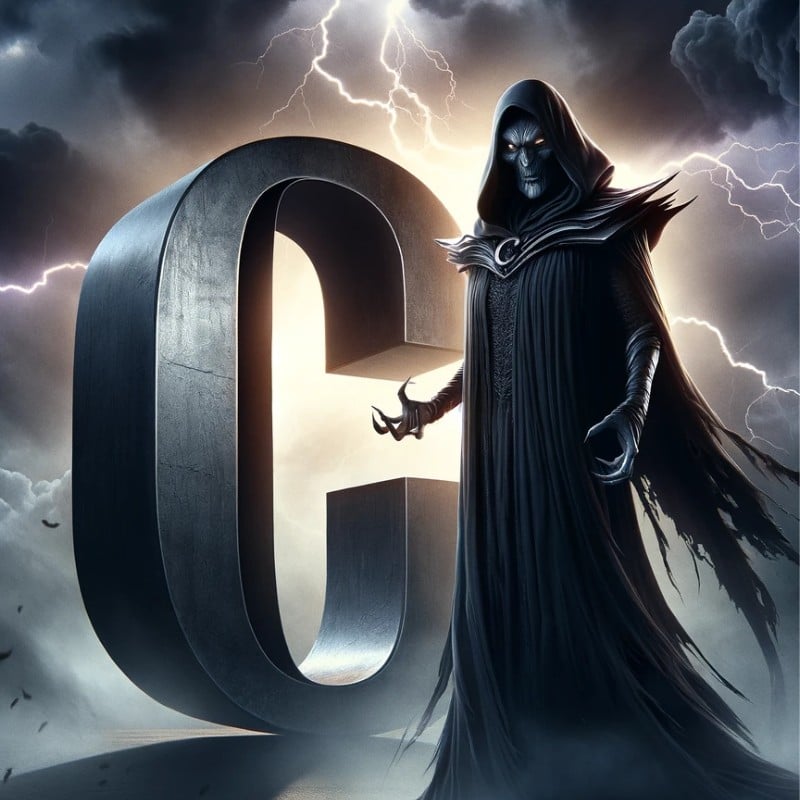
- Caim: A demon known for his ability to communicate with animals and considered a great president in Hell.
- Camio: Another spelling of Caim, a demon thought to be a master of communication with a persuasive voice.
- Carreau: A demon who tempts people with hardness of heart and is known in demonology as a powerful entity.
- Cerberus: In Greek mythology, Cerberus is the three-headed dog that guards the gates of the Underworld to prevent the dead from leaving.
- Chax: Another name for Scox, a Grand Duke of Hell who is said to hold the secrets of divine and otherworldly writings.
- Chemosh: An ancient Moabite god who was later considered a demon in Judeo-Christian tradition.
- Choronzon: A demon or devil that represents the abyss and chaos, often associated with thelema and occult practices.
- Cimeries: Also known as Cimejes, this demon is described as a powerful marquis who rides a black horse and rules over spirits in Africa.
- Coyote: While primarily known as a trickster figure in Native American mythology, Coyote has aspects that can be seen as malevolent or evil.
- Cresil: One of the seven princes of Hell, Cresil is a demon of sloth and impurity.
- Crocell: Also known as Procell, this demon is a Duke of Hell who teaches geometry and other liberal sciences.
- Cunali: One of the demons that serve Camio, a president of Hell.
- Cuthbert: While historically the name of a saint, in some modern fictional contexts, Cuthbert has been used for demonic or evil characters.
- Cythnigot: A demon whose name appears in occult lore, often associated with darkness and the unknown.
D

- Dagon: In ancient Semitic religion, Dagon was a god of fertility and agriculture, later depicted as a demon in Christian demonology.
- Damballa: A serpent god from Vodou, often depicted as a source of creation, but can be seen as malevolent in some interpretations.
- Decarabia: A demon who appears as a star in a pentacle and is a Great Marquis of Hell, with the power to manifest as any type of bird.
- Deimos: In Greek mythology, Deimos is the personification of terror and a companion of war, often associated with a foreboding presence.
- Demogorgon: A powerful demon whose name is synonymous with the underworld and is often used to denote a particularly feared or powerful entity.
- Drekavac: Stemming from Slavic mythology, Drekavac is a demon associated with the souls of unbaptized children, manifesting as a disturbing creature.
- Dzoavits: An ogre from Native American mythology who is known to steal the sun and is associated with evil deeds.
- Dantalion: A Duke of Hell who teaches all arts and sciences, and can influence the thoughts of others.
- Diabolos: The Greek word for “slanderer” or “accuser,” it is often used as a name for the Devil in Christianity.
- Dispater: A Roman god of the underworld, later considered a demon in Christian demonology, known for his rich treasures.
- Div-e Sepid: A demon from Persian mythology, the “White Demon” was the chieftain of the Divs (demons) and an enemy of the hero Rostam.
- Djall: An alternative spelling of “Djall,” which is sometimes used to refer to the Devil in various cultures.
- Dracula: While primarily known as the famous vampire from Bram Stoker’s novel, the name Dracula is often associated with evil and darkness.
- Dumah: In Jewish mythology, Dumah is an angel of silence and the stillness of death, but is also associated with the underworld and a demon of vindictive destruction.
- Dusios: A demon from Gaulish mythology, Dusios is known for his malevolent acts and for inciting panic and fear.
E
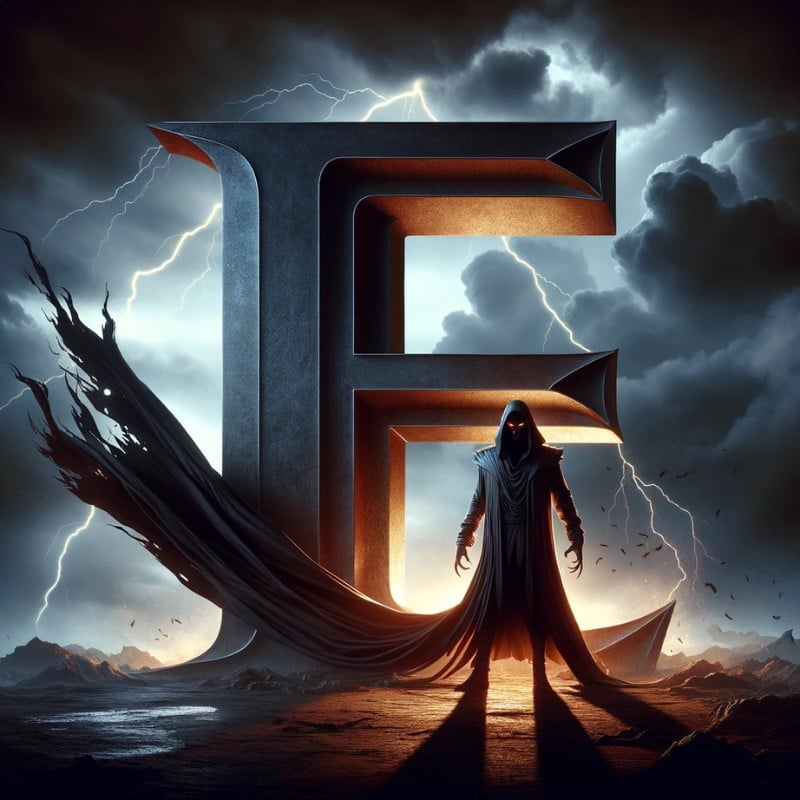
- Eblis: In Islamic theology, Eblis is the name of the devil who refused to bow to Adam, often associated with pride and rebellion.
- Eclipse: A name that suggests darkness overshadowing light, often used metaphorically to represent an overshadowing evil.
- Egregor: A name derived from the concept of a collective group mind that can become a separate entity, often taking on a malevolent will of its own.
- Eidolon: A spectral apparition or a phantom, often used to describe a haunting presence or a ghostly figure.
- Eligor: A demon name from the Ars Goetia, Eligor is a Great Duke of Hell who commands legions and is a master of warfare and strategy.
- Ember: While typically associated with the dying embers of a fire, it can also suggest smoldering malevolence or a threat that can reignite.
- Enigma: A name that evokes mystery and something that is difficult to understand or interpret, often associated with riddles and dark secrets.
- Envy: One of the seven deadly sins, a name that personifies jealousy and covetousness, often leading to malicious acts.
- Erebus: In Greek mythology, Erebus is the personification of deep darkness and shadow, often used to describe the dark regions of the underworld.
- Eris: The Greek goddess of chaos, strife, and discord, a name that implies turmoil and conflict.
- Etrigan: A name taken from a comic book character who is a demon bound to a human host, symbolizing the struggle between good and evil.
- Euryale: One of the three Gorgon sisters in Greek mythology, Euryale’s gaze could turn onlookers to stone, much like her sister Medusa.
- Exodus: Typically a mass departure, but as a name, it could symbolize the departure from morality or the exodus of goodness.
- Exuro: Derived from the Latin for ‘to burn up’ or ‘to set fire to’, suggesting a character who brings destruction through fire.
- Ezazel: A variation of Azazel, a fallen angel or demon associated with the scapegoat rite in the Bible, often linked to desolation and impurity.
- Eclipse: A name that suggests darkness overshadowing light, often used metaphorically to represent an overshadowing evil.
- Ego: A name that plays on the concept of an inflated sense of self-importance, which can lead to destructive behavior.
- Eldritch: A term that describes something eerie, weird, and spine-chilling, often associated with the supernatural or the unknown.
- Enforcer: A name that suggests someone who imposes their will upon others, often through intimidation or violence.
- Entropy: A concept from physics that can be used metaphorically to represent chaos, disorder, and the inevitable decline into disorder.
- Eris: The Greek goddess of chaos, strife, and discord, a name that implies turmoil and conflict.
- Esbat: A term used in some modern Pagan traditions for a ritual gathering, but as a name, it could imply dark, occult practices.
- Euryale: One of the three Gorgon sisters in Greek mythology, Euryale’s gaze could turn onlookers to stone, much like her sister Medusa.
- Evadne: A name from Greek mythology that means ‘well, truly’, but can evoke a sense of tragic destiny or dark fate.
- Evanescence: A name that suggests something that fades away or disappears, like a fleeting and insubstantial presence with a potentially malevolent aspect.
- Eventide: A poetic term for evening or twilight, but as a name, it can suggest the onset of darkness or the darker aspects of nightfall.
- Everto: Derived from the Latin word for ‘overthrow’ or ‘destroy’, making it suitable for a character who embodies destruction or downfall.
- Exidium: A Latin term for ‘destruction’, it can be used as a name for someone who is a harbinger of ruin.
- Exile: A name that suggests banishment and isolation, often associated with someone cast out due to their malevolent nature.
- Exordium: A term that means ‘the beginning’, which could be twisted to represent the start of something dark or ominous.
- Exsecror: Latin for ‘to curse’, this name could befit a character who brings curses upon others or is themselves cursed.
- Extor: Shortened from ‘extort’, a name that implies the use of threats or manipulation to gain something, often associated with criminal or malevolent behavior.
- Exulansis: A name derived from a term describing the tendency to give up trying to talk about an experience because others are unable to relate to it, suggesting a character who is isolated in their darkness.
- Eyegouge: A brutally direct name that implies violence and a penchant for maiming or blinding.
- Ezili: A name inspired by voodoo spirits, or loas, Ezili could represent different aspects, including love and beauty, but also has darker aspects.
- Erebos: Another form of Erebus, the primordial deity representing the personification of darkness in Greek mythology.
- Eclipse: A name that suggests darkness overshadowing light, often used metaphorically to represent an overshadowing evil.
- Eidolon: A spectral apparition or a phantom, often used to describe a haunting presence or a ghostly figure.
- Eldritch: A term that describes something eerie, weird, and spine-chilling, often associated with the supernatural or the unknown.
- Eris: The Greek goddess of chaos, strife, and discord, a name that implies turmoil and conflict.
- Eviscerate: A name that graphically suggests the act of disemboweling or destroying something with extreme violence.
- Excruciate: A name derived from the act of inflicting severe pain or torture, both physical and mental.
- Exsanguinate: A term that means to drain of blood, often associated with vampirism or a violent, bloodthirsty act.
- Exterminus: A name suggesting the ultimate end or destruction, often associated with the eradication of all things.
- Ezmodeus: A play on Asmodeus, a king of demons known in Judeo-Islamic lore, often associated with lust and manipulation.
F
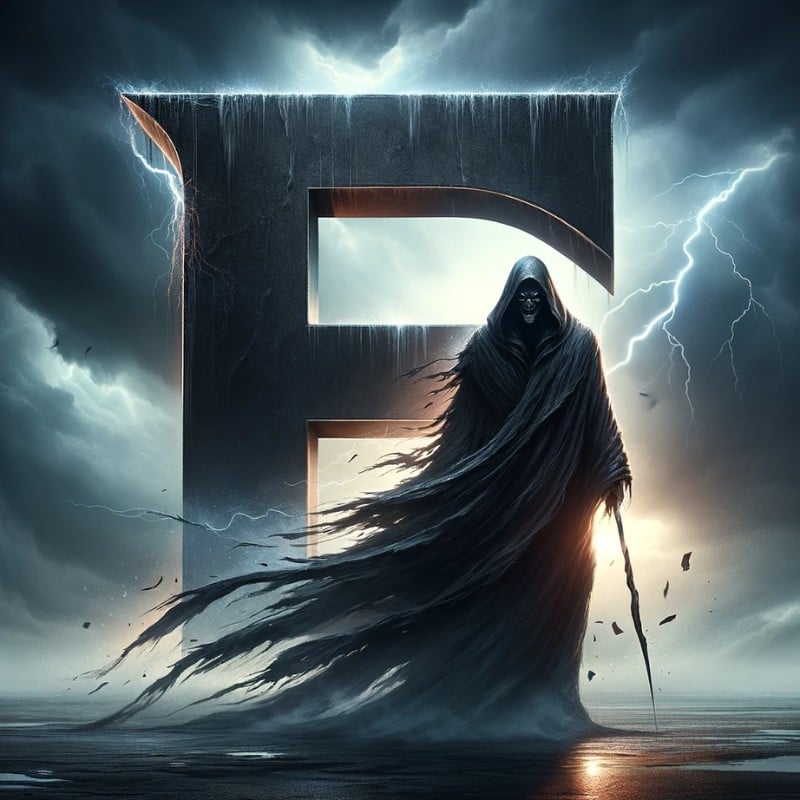
- Focalor: A powerful Great Duke of Hell, Focalor is known for commanding three or thirty legions of spirits and has power over wind and sea.
- Foras: A President of Hell, Foras teaches logic and ethics and can make one invisible, eloquent, and live long.
- Forneus: A Great Marquis of Hell, Forneus teaches rhetoric and languages, gives a good reputation, and is known to cause men to be loved by their enemies.
- Forras: Sometimes considered an alternate spelling of Foras, this demon is known for similar attributes.
- Furfur: A Count of Hell who appears as a hart with a fiery tail, Furfur causes love between a man and a woman and storms.
- Furcas: A Knight of Hell, Furcas teaches philosophy, rhetoric, astronomy, logic, chiromancy, and pyromancy.
- Fleruty: A Lieutenant General of Hell who commands 100 legions, Fleruty’s domain is snow.
- Flauros: A Great Duke of Hell, Flauros appears as a leopard and has the power to see the past and future and burn enemies.
- Fenriz: Also known as Fenrir, this monstrous wolf from Norse mythology is prophesied to kill the god Odin during Ragnarök but is often depicted as an evil being.
- Frederick: While not inherently evil, the name Frederick has been used for villains in various works of fiction.
- Fomorians: In Irish mythology, the Fomorians are a dark and hostile tribe of supernatural beings often portrayed as evil or malevolent.
- Familiars: While not a specific name, familiars are supernatural entities believed to assist witches and magicians, often depicted as malevolent or demonic.
- Fand: In Irish mythology, Fand is a fairy queen, but her name has been used for sinister characters in some modern fictional works.
- Furfur: A Great Earl of Hell, Furfur causes love and friendships and can create storms and tempests.
G

- Ghastly: A name that invokes a sense of horror, fear, and something that is shockingly frightful or dreadful.
- Gloom: Suggesting darkness and despair, this name evokes a sense of hopelessness or depression.
- Gorgon: Derived from Greek mythology, a Gorgon is a creature with hair made of snakes, whose gaze could turn people to stone.
- Grimoire: A term for a book of magical knowledge, particularly one containing spells, conjurations, and the secrets of the occult.
- Grimwald: A name that combines “grim,” meaning stern or forbidding, with “wald,” a rule or power, suggesting a harsh and powerful ruler.
- Grindel: A variant of Grendel, the monster from the Old English epic “Beowulf,” known for its savagery and darkness.
- Grotesque: A name that implies distortion, unnatural combinations, and often a sense of the macabre or bizarre.
- Ghoul: A name taken from folklore, describing a creature that robs graves and consumes the dead.
- Gibbet: An old term for a gallows, evoking images of execution and death, suitable for a character associated with punishment and the macabre.
- Gloom: Suggesting darkness and despair, this name evokes a sense of hopelessness or depression.
- Gargantua: A name that suggests something gigantic and monstrous, from Rabelais’ giant character in literature.
- Gehenna: A term originally denoting a place of punishment and later used to refer to a destination of the wicked or a hell-like place.
- Gluttony: One of the seven deadly sins, representing excessive greed and overindulgence, often to a self-destructive degree.
- Golgotha: The name of the place where Jesus was crucified, meaning “the place of the skull,” it can evoke a sense of death and sacrifice.
- Gomorrah: A biblical city associated with sin, destruction, and divine judgment, often used metaphorically for places of great evil.
- Gorgon: Derived from Greek mythology, a Gorgon is a creature with hair made of snakes, whose gaze could turn people to stone.
- Grimalkin: An archaic term for a cat, often associated with witchcraft and sometimes used to describe a malevolent or mysterious old woman.
- Grimoire: A term for a book of magical knowledge, particularly one containing spells, conjurations, and the secrets of the occult.
- Grimwald: A name that combines “grim,” meaning stern or forbidding, with “wald,” a rule or power, suggesting a harsh and powerful ruler.
- Grindel: A variant of Grendel, the monster from the Old English epic “Beowulf,” known for its savagery and darkness.
- Grimm: A name that evokes the famous Brothers Grimm and their dark, often morbid fairy tales, suitable for a character with a sinister story to tell.
- Grisly: A name that suggests something causing horror or disgust, often associated with gruesome or gory scenes.
- Grotesque: A name that implies distortion, unnatural combinations, and often a sense of the macabre or bizarre.
- Ghoul: A name taken from folklore, describing a creature that robs graves and consumes the dead.
- Gibbet: An old term for a gallows, evoking images of execution and death, suitable for a character associated with punishment and the macabre.
- Gloom: Suggesting darkness and despair, this name evokes a sense of hopelessness or depression.
- Gargantua: A name that suggests something gigantic and monstrous, from Rabelais’ giant character in literature.
- Gehenna: A term originally denoting a place of punishment and later used to refer to a destination of the wicked or a hell-like place.
- Gluttony: One of the seven deadly sins, representing excessive greed and overindulgence, often to a self-destructive degree.
- Golgotha: The name of the place where Jesus was crucified, meaning “the place of the skull,” it can evoke a sense of death and sacrifice.
- Gomorrah: A biblical city associated with sin, destruction, and divine judgment, often used metaphorically for places of great evil.
- Gorgon: Derived from Greek mythology, a Gorgon is a creature with hair made of snakes, whose gaze could turn people to stone.
- Grimalkin: An archaic term for a cat, often associated with witchcraft and sometimes used to describe a malevolent or mysterious old woman.
- Grimoire: A term for a book of magical knowledge, particularly one containing spells, conjurations, and the secrets of the occult.
- Grimwald: A name that combines “grim,” meaning stern or forbidding, with “wald,” a rule or power, suggesting a harsh and powerful ruler.
- Grindel: A variant of Grendel, the monster from the Old English epic “Beowulf,” known for its savagery and darkness.
- Grimm: A name that evokes the famous Brothers Grimm and their dark, often morbid fairy tales, suitable for a character with a sinister story to tell.
- Grisly: A name that suggests something causing horror or disgust, often associated with gruesome or gory scenes.
- Grotesque: A name that implies distortion, unnatural combinations, and often a sense of the macabre or bizarre.
- Grendel: The name of the beast from “Beowulf,” representing a figure of menace and destruction.
- Grim: A name suggesting severity and a lack of warmth or light, often used to describe the personification of death.
- Griselda: A name that can be associated with patience and endurance, but in a dark context, it can suggest a grim and hardened individual.
- Grizzle: A name that can evoke a sense of something that is grizzled or worn, perhaps by a life of villainy or hardship.
- Grotto: While typically a cave or small picturesque cave, it can also suggest a hidden place where dark deeds are plotted.
- Guile: A name that suggests sly or cunning intelligence used to deceive or manipulate others.
- Gunnar: A name of Nordic origin meaning “warrior,” which could be used for a character known for their relentless and aggressive nature.
- Gytrash: A name taken from English folklore, describing a mythical black dog known to haunt lonely roads, a portent of doom.
H
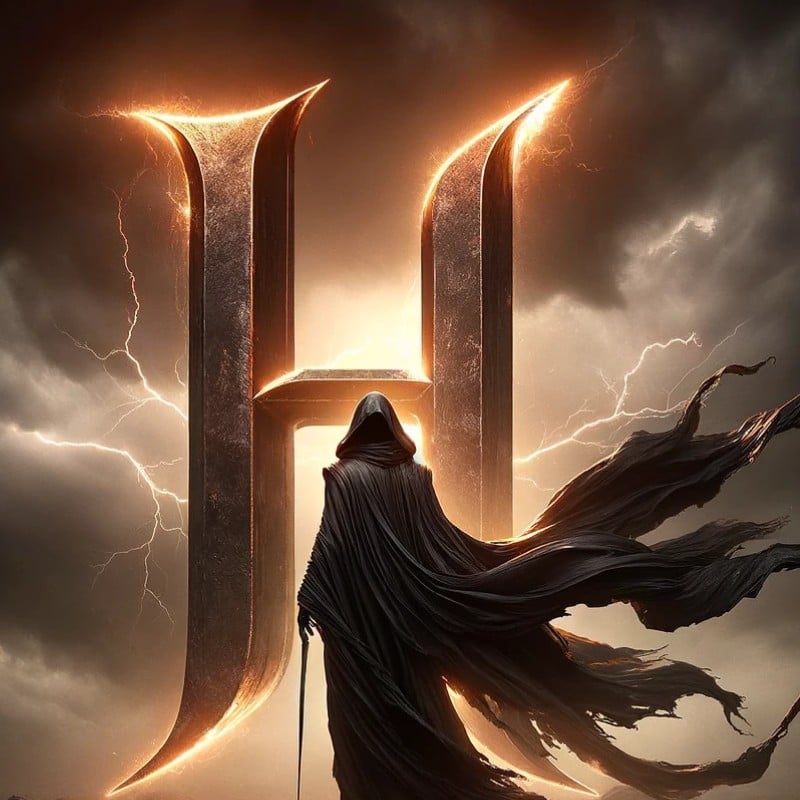
- Haborym: Another name for Aym or Aim, a Great Duke of Hell, who commands twenty-six legions of demons and can set cities and great places on fire.
- Hades: The Greek god of the underworld, often associated with death and the afterlife, and sometimes depicted as a malevolent figure in modern interpretations.
- Hagith: One of the seven Olympian spirits, known in occultism, Hagith governs matters of love and transformations.
- Halpas: A Great Earl of Hell, Halpas is said to command thirty-six legions of demons and can incite wars and move armies.
- Haures: Also known as Flauros, Haures is a Great Duke of Hell who gives true answers of all things past, present, and future but must be commanded into a triangle first.
- Hecate: A goddess from Greek mythology associated with magic, witchcraft, and crossroads, often represented as a figure of dark and forbidden powers.
- Hela: In Norse mythology, Hela is the goddess of the dead and the underworld, ruling over the realm of the same name.
- Hellfire: While not a being, hellfire is often personified in literature and mythology as a consuming, evil force.
- Hemlock: Known as a poisonous plant, Hemlock has been used as a name for evil characters in stories and legends.
- Herensugue: A seven-headed dragon from Basque mythology, sometimes associated with evil due to its fearsome nature.
- Hinn: In Arabian mythology, the Hinn are supernatural spirits akin to jinn but are often considered to be more malevolent.
- Hiisi: A term used in Finnish and Estonian folklore to describe a malevolent spirit or a demon.
- Hob: In English folklore, Hob is a household spirit, but the name is sometimes used for goblin-like creatures that are mischievous or evil.
- Holle: Mother Holle, or Frau Holle, is a figure from German folklore who can be both benevolent and malevolent, sometimes associated with witchcraft or the supernatural.
- Horned King: A title used in various mythologies and fantasy stories, often representing a demonic or evil ruler with horns.
I
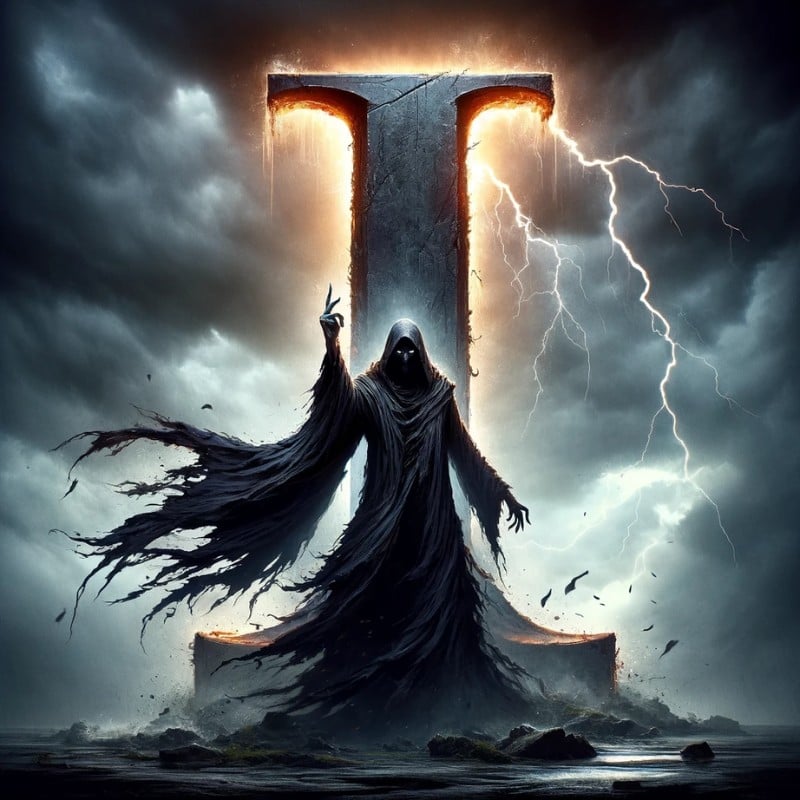
- Iblis: In Islamic theology, Iblis is the name of the devil who refused to bow to Adam, representing pride and rebellion.
- Ichor: The fluid that flows like blood in the veins of the gods in Greek mythology, often associated with a substance that is poisonous or deadly to mortals.
- Ignis: Latin for “fire,” it can be associated with destruction, passion, and transformation, often with a sinister undertone.
- Impious: A name that denotes a lack of respect for the sacred or religious, suitable for a character who defies the divine.
- Incubus: A male demon believed in medieval times to lie upon sleeping women, representing dark sexual energies and nightmares.
- Inferno: Italian for “hell,” this name is associated with uncontrolled fire, chaos, and the torments of the damned.
- Iniquity: A name that embodies wickedness, sin, and gross injustice, suitable for a character of evil deeds and moral turpitude.
- Insidious: A name that suggests a gradual and subtle harm, often with treacherous intent.
- Ire: A name that represents anger and wrath, suitable for a character with a fiery and vengeful disposition.
- Irk: A simple name that suggests annoyance and irritation, which could grow into a deeper malevolence.
- Ironclad: A name that implies strength, rigidity, and an impenetrable nature, often associated with an unyielding force of evil.
- Israfel: An alternate spelling of Israfil, the angel who will blow the trumpet to signal the Day of Judgment in Islam, but as a name, it can suggest an ominous herald.
- Ivy: While typically a plant, as a name, it can suggest something that entwines and entraps, growing insidiously.
- Iago: The name of the treacherous villain in Shakespeare’s “Othello,” associated with deceit and manipulation.
- Icarus: From Greek mythology, Icarus flew too close to the sun, and his name can symbolize reckless ambition that leads to downfall.
- Ichabod: A biblical name that means “the glory has departed,” often used to signify bad luck or a lack of fortune.
- Iconoclast: A name for someone who attacks or challenges cherished beliefs and institutions, potentially representing a force of destruction.
- Idol: A name that can suggest false worship or a focus of blind adoration that may lead to ruin.
- Igneous: Related to fire and the formation of volcanic rock, this name can evoke a sense of fiery destruction or a fiery personality.
- Illusion: A name that signifies deception, trickery, and the art of misleading, suitable for a character who thrives on falsehoods.
- Immolate: A name that suggests sacrifice through fire, often associated with destruction and offering.
- Imperator: Latin for “commander” or “emperor,” a name that can be associated with absolute power and possibly tyranny.
- Impervious: A name that implies an inability to be affected or hurt, suitable for a character who is cold and unfeeling.
- Incantation: A name that suggests the use of spells and magic, often with a dark or manipulative intent.
- Infernal: A name that signifies belonging to the underworld or hell, associated with fiendish qualities and diabolical deeds.
- Ingrate: A name that suggests ungratefulness, often associated with a character who betrays benefactors or spurns kindness.
- Iniquitous: Similar to “Iniquity,” this name embodies the essence of evil actions and gross injustice.
- Inquisitor: A name that implies the act of inquiring with a sense of authority, often associated with interrogation and persecution.
- Insurgent: A name that suggests rebellion and uprising, often against established authority, which can be twisted into a force of chaos.
- Interdict: A name that implies a prohibition or an authoritative ban, suitable for a character who enforces restrictions or wields control.
- Intrigue: A name that suggests secret plotting and the manipulation of events, often with sinister undertones.
- Invidious: A name that suggests causing resentment, envy, or ill will, often associated with unfair discrimination or deceit.
- Ironmonger: A name that could be associated with someone who deals in instruments of war or implements of death.
- Irritant: A name that implies causing discomfort or agitation, suitable for a character who provokes conflict.
- Isolate: A name that suggests being cut off or apart from others, which can be associated with a character who is a loner or outcast.
- Ivory: While often associated with beauty and value, as a name, it can suggest a cold, hard nature, much like the material itself.
J

- Jezebeth: A demon of falsehoods and lies, often depicted in demonology texts.
- Jilaiya: A creature from Indian folklore that feeds on human flesh and blood, particularly that of the tongue.
- Jinn: Supernatural creatures in early Arabian and later Islamic mythology and theology that can be either good or evil.
- Jormungand: In Norse mythology, Jormungand, the Midgard Serpent, is a sea creature destined to fight Thor during Ragnarök.
- Jubokko: In Japanese folklore, the Jubokko is a vampire tree that became malevolent after growing on a battlefield soaked with blood.
- Jikininki: In Japanese Buddhism, Jikininki are human-eating ghosts that are cursed to eat the corpses of humans as punishment for leading a greedy and selfish life.
- Jumbee: A term used in the Caribbean to describe malevolent spirits or demons, often associated with traditional ghost stories.
- Jezebel: Originally the name of a Phoenician princess in the Bible who was associated with false prophets, later used to refer to wicked or shameless women.
- Jabberwock: A creature from Lewis Carroll’s “Through the Looking-Glass” with a fearsome reputation, often used to represent something evil or terrifying.
- Jack O’Lantern: Stemming from Irish folklore, Jack O’Lantern refers to a wandering soul bearing a lantern, and its imagery is often associated with malevolent forces during Halloween.
- Judas: While a common given name, Judas Iscariot’s betrayal of Jesus Christ in the New Testament has led to the name being used for traitorous or evil characters in literature and popular culture.
- Jumlin: A vampire figure in Native American mythology, said to be the first vampire created from the chaos of the world.
- Jengu: Water spirits in the traditional beliefs of the Sawa ethnic groups, they can be protective but are often feared for their abilities to cause ailments.
- Jengu: Water spirits in the traditional beliefs of the Sawa ethnic groups, they can be protective but are often feared for their abilities to cause ailments.
- Jiangshi: Reanimated corpses in Chinese legends and folklore, also known as “hopping vampires” that suck the life force from the living.
K

- Kabal: A name reminiscent of “cabal,” suggesting secretive knowledge and possibly dark conspiracies or mystical practices.
- Kain: A variant of “Cain,” the first murderer in the Bible, associated with fratricide and a cursed existence.
- Kali: In Hindu mythology, Kali is a goddess of death, time, and doomsday, often associated with violence but also seen as a strong mother figure.
- Kardia: Derived from the Greek word for “heart,” this name could suggest a heart of darkness or a cold-hearted nature.
- Karkinos: The Greek word for “crab,” but also the name of a giant crab in Greek mythology that fought Heracles, representing a tenacious and malignant force.
- Karnage: A play on the word “carnage,” suggesting large-scale violence, bloodshed, and destruction.
- Kasdeya: From the Book of Enoch, one of the five Satans who taught humanity all sorts of sinful acts, associated with forbidden knowledge.
- Keres: In Greek mythology, the Keres were female death-spirits, the daughters of Nyx, who personified violent death and the dark side of human mortality.
- Ketamine: While a medical anesthetic, as a name, it could evoke a sense of numbness or a character who induces forgetfulness or a trance-like state.
- Khaos: The transliteration of “Chaos,” the primeval void in Greek mythology, representing the disordered state that existed before the cosmos was ordered.
- Killer: A straightforward name that implies a person who takes life, often associated with ruthlessness and a lack of empathy.
- Kismet: An Arabic term for fate or destiny, which can be twisted to imply a dark fate or an inescapable doom.
- Knox: A name that evokes the image of a fortified place, suggesting someone who is impenetrable or who guards secrets.
- Korbin: A name derived from “corbin,” meaning “raven,” often associated with omens, death, and the mystical.
- Kraken: A legendary sea monster of gigantic size, often associated with terror and destruction at sea.
- Krait: A type of venomous snake found in South Asia, suggesting danger, stealth, and a deadly nature.
- Kronos: In Greek mythology, the leader of the Titans, who overthrew his own father and was later overthrown by his son Zeus, associated with time and a fearsome rule.
- Kurgan: A term for a type of burial mound or barrow, associated with the ancient Scythians, suggesting death and ancient rites.
- Kurios: Greek for “lord” or “master,” implying authority and control, which could be used for a character with a commanding presence.
- Kyanite: A mineral name that sounds sharp and could be associated with a character who is both beautiful and deadly.
- Kydoimos: The Greek daemon of the din of battle, confusion, uproar, and hubbub, suitable for a character who thrives in chaos.
- Kynigos: Greek for “hunter,” suggesting a character who relentlessly pursues their prey or objectives.
- Kyrios: Another form of “Kurios,” denoting lordship and mastery, but can also imply a dictatorial or domineering character.
- Keres: In Greek mythology, the Keres were female death-spirits, the daughters of Nyx, who personified violent death and the dark side of human mortality.
- Kolasis: Greek for “punishment,” the term can be used for a character who embodies retribution or who delights in the suffering of others.
- Koschei: In Slavic folklore, Koschei the Deathless is an evil figure who cannot die and often kidnaps the hero’s wife, embodying the concept of an undying evil.
- Kronos: In Greek mythology, the leader of the Titans, who overthrew his own father and was later overthrown by his son Zeus, associated with time and a fearsome rule.
- Kurgan: A term for a type of burial mound or barrow, associated with the ancient Scythians, suggesting death and ancient rites.
- Kurios: Greek for “lord” or “master,” implying authority and control, which could be used for a character with a commanding presence.
- Kyanite: A mineral name that sounds sharp and could be associated with a character who is both beautiful and deadly.
- Kydoimos: The Greek daemon of the din of battle, confusion, uproar, and hubbub, suitable for a character who thrives in chaos.
- Kynigos: Greek for “hunter,” suggesting a character who relentlessly pursues their prey or objectives.
- Kyrios: Another form of “Kurios,” denoting lordship and mastery, but can also imply a dictatorial or domineering character.
L

- Lamashtu: A malevolent goddess from Mesopotamian mythology known for preying on mothers and infants.
- Lamia: In Greek mythology, Lamia is a mistress of Zeus who became a child-eating demon.
- Legion: A group of demons referred to in the New Testament of the Bible, who possessed a man and identified themselves as “Legion, for we are many.”
- Leviathan: A sea monster referenced in the Hebrew Bible, often symbolizing chaos and sometimes considered a demon of envy in Christian demonology.
- Lilin: Demonic creatures in Jewish folklore believed to be the descendants of Lilith.
- Lilith: According to Jewish folklore, Lilith was Adam’s first wife who became a night demon for refusing to obey him.
- Lix Tetrax: A wind demon in the Testament of Solomon, associated with causing epileptic seizures.
- Lucifer: Originally a Latin name meaning “light-bringer,” it became associated with the fallen angel who became the Devil in Christian theology.
- Lucifuge Rofocale: According to the Grand Grimoire, a demonic high-ranking officer under Lucifer, often associated with pacts and wealth.
- Leraje: A mighty Great Marquis of Hell who causes great battles and disputes, and is depicted as an archer in green.
- Leonard: A demon or devil figure in the Dictionnaire Infernal, considered the master of Sabbaths.
- Lechies: Slavic forest spirits that can be both benevolent and malevolent, sometimes associated with guiding lost souls to the afterlife.
- Lempo: A god of love and fertility in Finnish mythology, later demonized as a figure of lust and chaos.
- Lerajie: An alternate spelling of Leraje, a demon who instigates battles.
- Lotan: A seven-headed sea serpent or dragon from Ugaritic myths, often equated with Leviathan.
M
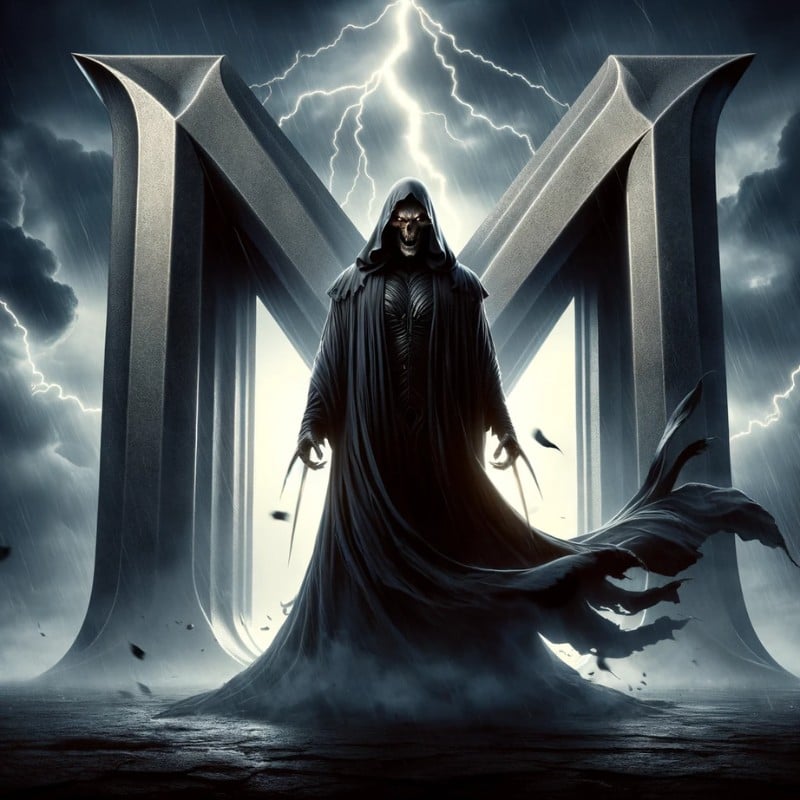
- Machination: A name that suggests scheming and crafty plotting, often for sinister purposes.
- Maelstrom: A powerful whirlpool in the sea or a river, metaphorically representing a state of turmoil or chaos.
- Malefic: Derived from Latin, meaning ‘harmful’ or ‘evil,’ often used to describe something that deliberately causes harm or misfortune.
- Malevolent: A name that embodies ill will, spite, or hatred, suitable for a character who wishes harm to others.
- Malice: A name that signifies the intent to do evil or harm, reflecting a deep-seated meanness or spitefulness.
- Malign: To speak harmful untruths about; to slander; a name that could befit a character who spreads evil or negativity.
- Malignant: A name that suggests a harmful influence or the presence of intense ill will, often associated with cancerous growth.
- Malik: Arabic for ‘king’ or ‘sovereign,’ which could be used for a character with a commanding or authoritative presence.
- Mammon: A term that typically refers to wealth regarded as an evil influence or false object of worship and devotion.
- Manticore: A mythical beast with the body of a lion, the face of a man, and the sting of a scorpion, symbolizing a monstrous and dangerous entity.
- Mara: A demonic being from Buddhist mythology that personifies unwholesome impulses, death, and the temptation to unskillful behaviors.
- Marauder: A name that suggests someone who raids or plunders, seeking to steal or cause havoc.
- Mare: While a term for a female horse, in folklore, it also refers to a demonic creature that sits on people’s chests while they sleep, causing nightmares.
- Marplot: A name that suggests someone who spoils a plot or hinders the success of an undertaking, often unintentionally.
- Masquerade: A name that implies a false show or pretense, often used to hide one’s true intentions or identity.
- Maverick: Originally meaning an unbranded calf, now used to describe an independent-minded person, which could be twisted for a character who plays by their own rules.
- Maw: The jaws or throat of a voracious animal, suggesting a gaping and insatiable appetite for destruction.
- Mefisto: A variant of Mephistopheles, a demon from German folklore, famously associated with the Faust legend.
- Menace: A name that suggests a threat or danger, often used for a character who poses a looming threat.
- Mephisto: Short for Mephistopheles, a demon from German folklore who makes a pact with Faust, often associated with temptation and the cunning exchange of soul for worldly pleasures.
- Merciless: A name that suggests a lack of compassion or pity, suitable for a character who is harsh and unforgiving.
- Mercurial: A name that implies volatility and unpredictability, often associated with a character who is quick-witted and changeable.
- Miasma: A name that suggests a noxious atmosphere or influence, often a poisonous environment or a corrupting influence.
- Mimic: A name that suggests the ability to copy or imitate, often used for a character who deceives by taking on other forms or appearances.
- Minion: A name that denotes a follower or underling, especially one who is servile or unimportant, often used for a character who is a willing accomplice to evil.
- Mirage: A name that suggests an illusion or something that is unattainable, often used to represent false hopes or deception.
- Miscreant: A name that describes a person who behaves badly or breaks the law, suitable for a character with a disreputable or villainous streak.
- Mischief: A name that suggests playful misbehavior or troublemaking, often with a light-hearted or impish connotation.
- Mist: While a natural phenomenon, as a name, it can suggest something that obscures or confuses, hiding danger or mystery within.
- Moloch: A name from biblical origins, associated with a Canaanite god to whom child sacrifices were made, representing a demanding or cruel figure.
- Monolith: A name that implies a large, powerful, and indivisible presence, often associated with something that is unyielding or inscrutable.
- Morbid: A name that suggests an unhealthy interest in death or disease, suitable for a character with a dark and macabre sensibility.
- Mordant: A name that can imply a sharp or biting quality, often associated with a character who has a caustic sense of humor or a cutting personality.
- Morgue: While a place where dead bodies are kept, as a name, it can evoke a sense of death and the macabre.
- Mortiferous: A name that means bringing death or destruction, suitable for a character who is deadly or lethal.
- Mortis: Derived from Latin, meaning ‘death,’ a name that could befit a character associated with death or the end of life.
- Mourn: A name that suggests sorrow and lamentation, often used for a character who brings grief or embodies sadness.
- Murk: A name that suggests darkness and gloom, often used to describe an atmosphere that is murky or unclear.
- Mycelium: The vegetative part of a fungus, consisting of a network of fine white filaments, it can suggest growth and spread in a hidden and potentially insidious manner.
- Myriad: A name that suggests a countless or extremely great number, which could be associated with a character who commands legions or has vast influence.
N

- Naamah: A demoness mentioned in ancient texts, often associated with seduction and the corruption of mankind.
- Naberius: Also known as Cerberus, a strong and valiant Marquis of Hell who commands nineteen legions of demons.
- Nachtzehrer: In German folklore, a nachtzehrer is a sort of vampire that consumes its family members after death.
- Naglfar: In Norse mythology, a ship made entirely of the nails of the dead, which is foretold to sail during Ragnarök, carrying hordes to battle the gods.
- Naamah: Sometimes considered a counterpart or consort to the demon Lilith, associated with seduction.
- Nalusa Falaya: A creature in Choctaw folklore, also known as the Long Black Being, which is said to slink through shadows and cause men to have wicked thoughts.
- Namtar: In Sumerian mythology, the god of death and pestilence, often considered a demon in later traditions.
- Naphula: An obscure demon mentioned in grimoires, known for her ability to alter time and perception.
- Nekhbet: Originally an Egyptian vulture goddess, sometimes depicted in a more demonic light in later interpretations.
- Nergal: A deity from Mesopotamian religion, associated with war and plague, later considered a demon in Christian demonology.
- Nihasa: A demon or evil spirit from Native American mythology, associated with the underworld or with malevolent influence.
- Nija: In Slavic mythology, a spirit associated with death and darkness.
- Nimue: Also known as Viviane, a character from Arthurian legend who can be seen as malevolent in some versions of the stories, often associated with enchantment and manipulation.
- Ninurta: An ancient Sumerian god of war and hunting, later depicted as a demon in Christian texts.
- Nybbas: In demonology, Nybbas is an inferior demon who manages visions and dreams, often depicted as a media-friendly figure in Hell’s hierarchy.
O
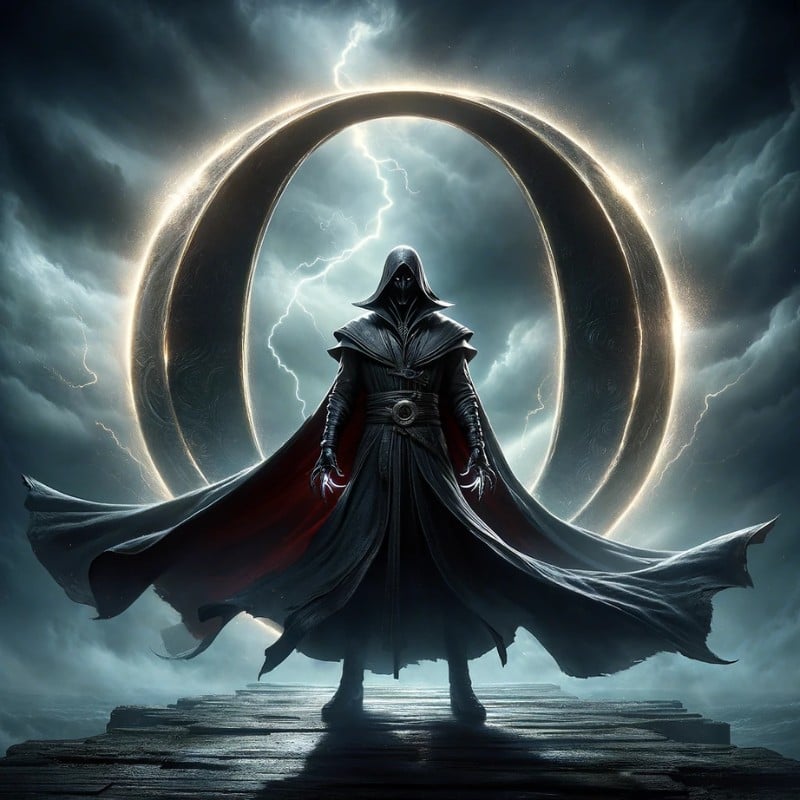
- O-Yama: Another name for Yama, the lord of death in Hindu and Buddhist mythology, who judges the souls of the deceased.
- Oberon: While typically known as the king of the fairies in medieval and Renaissance literature, Oberon can be portrayed as a malevolent character in some modern interpretations.
- Obyzouth: Another variant of Abyzou, a female demon blamed for miscarriages and infant mortality in Near Eastern and Mediterranean folklore.
- Orias: A Great Marquis of Hell who commands thirty legions of demons, Orias is known for teaching the virtues of the stars and the mansions of the planets.
- Orobas: A powerful Great Prince of Hell who gives true answers about the past, present, and future and confers dignities and prelacies.
- Orthon: A demon of unknown origins who is often associated with mischief and is known for disturbing the peace.
- Ose: Also spelled Oze, a Great President of Hell who commands three legions of demons and can turn humans into any shape.
- Oxym: A demon mentioned in the Dictionnaire Infernal, known to spread darkness and confusion.
- Orias: Sometimes spelled Oriax, a demon known for teaching astrology and divination, as well as giving dignities and prelacies.
- Orusula: A demon of Slavic origin, associated with dark rites and believed to bring misfortune and despair.
- Otokata: A Japanese demon, considered a vengeful spirit that brings harm to those who encounter it.
- Ovinnik: A Slavic demon in the form of a black cat or fire, believed to protect grains but could become malevolent if not respected.
- Onoskelis: A female demon from the Testament of Solomon, described as having a beautiful form and living in caves, known for seducing men.
- Oni: In Japanese folklore, Oni are typically portrayed as malevolent trolls or ogres that cause harm and disaster.
- Ole-Higue: In Caribbean folklore, an Ole-Higue is a type of vampire that sucks the blood of victims, often taking the form of an old woman by day.
P

- Pandemonium: A name derived from Milton’s “Paradise Lost,” referring to the capital of Hell, symbolizing chaos and disorder.
- Paradox: A name that suggests a statement or proposition that seems self-contradictory or absurd but in reality expresses a possible truth, often associated with characters who are enigmatic or contradictory in nature.
- Pariah: A name that implies an outcast or someone who is despised and avoided by society, suitable for a character who is shunned due to their actions or status.
- Pernicious: A name that signifies having a harmful effect, especially in a gradual or subtle way, often associated with insidious evil.
- Phantom: A name that evokes the image of a ghost or an apparition, representing something elusive and possibly haunting.
- Pitiless: A name that suggests a lack of mercy or compassion, suitable for a character who is harsh and unrelenting.
- Plague: A name that signifies a contagious bacterial disease or any widespread affliction, calamity, or destructive influence.
- Poison: A straightforward name that implies toxicity and harm, often used for characters with a dangerous or malevolent nature.
- Polarize: A name that suggests division into two sharply contrasting groups or sets of opinions or beliefs, suitable for a character who causes strife and discord.
- Praetor: A title granted to various high-ranking officials in ancient Rome, the name can be associated with power and authority, which can be wielded for good or ill.
- Predator: A name that signifies a creature that naturally preys on others, suitable for a character who is aggressive and hunts others.
- Premonition: A name that suggests a strong feeling that something is about to happen, especially something unpleasant, often associated with characters who have foresight or ominous warnings.
- Prestige: A name that implies respect and admiration felt for someone or something on the basis of a perception of their achievements or quality, which can be used for a character who is influential and commands respect, possibly through intimidation or manipulation.
- Primeval: A name that signifies belonging to the first ages of the world, often associated with ancient and fundamental forces or entities.
- Profane: A name that suggests irreverence toward what is sacred or contempt for what is considered holy, suitable for a character who defies the sacred.
- Progeny: A name that means descendants or offspring, which can be used for a character who creates or leads a new generation, possibly with a sinister implication.
- Protean: A name that implies versatility, adaptability, and the ability to assume many forms, often associated with characters who are elusive and changeable.
- Prowler: A name that suggests someone who moves stealthily or lurks, often with the intention of committing a crime or doing harm.
- Purge: A name that signifies the removal of undesirable elements, often with force or violence, suitable for a character who seeks to cleanse or eliminate.
- Pyre: A heap of combustible material, especially one for burning a corpse as part of a funeral ceremony, evoking images of death and the finality of burning away the past.
Q

- Quasit: In mythology and fantasy, a quasit is a malevolent spirit or demon that serves as a familiar, often taking on grotesque forms.
- Quetzalcoatl: While primarily known as a Mesoamerican deity associated with wisdom, the wind, and the arts, in some traditions, Quetzalcoatl is depicted with darker aspects or as a trickster.
- Quorlu: A creature of chaos from the Cthulhu Mythos, known for its ability to corrode and dissolve all matter.
- Qarinah: In Islamic theology, a Qarinah is a type of jinn or demonic entity that seduces men and sleeps with them.
- Qemuel: Also known as Kemuel, an angel who, according to some Jewish texts, became a fallen angel and is associated with destruction.
- Qliphoth: In Kabbalistic cosmology, the Qliphoth represent the antithetical forces of divine emanation, often associated with evil spirits or demons.
- Quimbanda: A term referring to one of the branches of Afro-Brazilian witchcraft, where entities called Exus are invoked, some of which are considered malevolent.
- Quisiri: A demon from South American folklore, particularly in the Andean regions, known for causing harm and misfortune.
- Quetzalcoatl: In some interpretations, particularly in the context of fictional works, Quetzalcoatl has been depicted as a villainous or adversarial force.
R
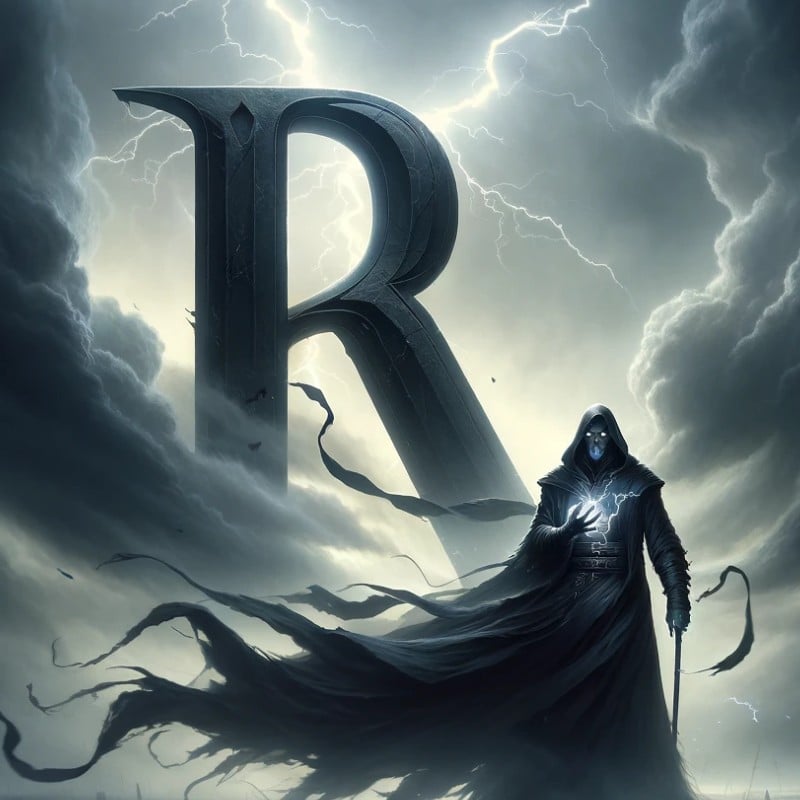
- Rahab: In biblical folklore, Rahab is a sea monster, a symbol of the chaos of the sea and the power that opposes God.
- Rakshasa: A demonic being from Hindu mythology, known for its shape-shifting abilities, malevolence, and affinity for human flesh.
- Rangda: In Balinese mythology, Rangda is a demon queen and the leader of the witches, constantly battling the forces of good.
- Ronove: A Marquis and Great Earl of Hell, commanding twenty legions of demons, known for his ability to teach languages and rhetoric.
- Ronwe: A lesser demon mentioned in the “Ars Goetia,” part of the “Lesser Key of Solomon,” who commands nineteen legions of imps.
- Rosier: A demon of love in some occult beliefs, who is said to incite passion not just in the hearts of men but also among the angelic order.
- Rumael: An angel in some Jewish traditions who became a fallen angel, associated with wrongdoing and evil deeds.
- Rusalka: In Slavic mythology, a rusalka is a water nymph or spirit that can be malevolent, luring men to their deaths with her beauty.
- Ravana: The primary antagonist in the Hindu epic “Ramayana,” Ravana is a ten-headed demon king of Lanka who kidnapped Sita.
- Raum: A Great Earl of Hell, commanding thirty legions of demons, known for stealing treasures and destroying cities and dignities of men.
- Rimmon: Also known as Damas, a demon and fallen angel often associated with storms and bad weather, worshiped in ancient Syria.
- Rahu: In Vedic astrology, Rahu is a shadow entity that causes eclipses, associated with malevolence, chaos, and unpredictability.
- Rofocale: An alternate name for Lucifuge Rofocale, the Prime Minister of Hell in the Grand Grimoire, who despises the light.
- Romaim: A demon mentioned in the Testament of Solomon, known for causing headaches and possessing the power to manipulate minds.
- Rimmon: In demonology, Rimmon is a demon of storms and rain, often identified with the Syrian god Hadad.
S

- Saboteur: A name that suggests someone who deliberately destroys, damages, or obstructs something, often for political or military advantage.
- Sanguine: While it can mean optimistic or positive, in a darker context, it also refers to a blood-red color, evoking images of bloodshed or a bloody disposition.
- Sarcophagus: A stone coffin, typically adorned with a sculpture or inscription, associated with the ancient practices of preserving the dead.
- Sardonic: A name that implies a grimly mocking or cynical disposition, suitable for a character with a dark sense of humor.
- Scourge: A name that signifies a person or thing that causes great trouble or suffering, often used for a character who is a source of punishment or affliction.
- Sectarian: A name that suggests strong adherence to a particular sect or party, often associated with conflict and division.
- Seditious: A name that implies incitement of discontent or rebellion against a government or authority, suitable for a character who stirs up revolt.
- Sepulcher: A small room or monument, cut in rock or built of stone, in which a dead person is laid or buried, evoking a sense of the grave and the finality of death.
- Seraph: Traditionally a celestial being with three pairs of wings, but as a name, it could suggest a character with a deceptive angelic appearance hiding a darker nature.
- Serpentine: A name that suggests the characteristics of a serpent, such as sneakiness, danger, and a potentially venomous nature.
- Shade: A name that can refer to a ghost or specter, representing something or someone who is elusive and possibly haunting.
- Shaman: A person regarded as having access to, and influence in, the world of good and evil spirits, which can be twisted for a character who delves into dark arts.
- Shroud: A cloth used to wrap a body for burial, this name can evoke a sense of mystery, concealment, and death.
- Silhouette: A name that suggests a dark shape or outline against a lighter background, often used to represent something mysterious or unknown.
- Sinister: A name that implies a threatening or portentous aspect, often associated with evil or malevolence.
- Skein: A length of thread or yarn, loosely coiled and knotted, but metaphorically, it can suggest a complicated or tangled situation.
- Skulk: A name that suggests moving in a stealthy or furtive manner, often associated with someone who is up to no good.
- Sleight: A name that implies cunning or deceit, especially in using dexterity or craftiness to deceive others.
- Sluagh: In Irish folklore, the Sluagh are the spirits of the restless dead, sometimes considered malicious and feared.
- Smog: A name that combines smoke and fog to describe a type of air pollution, suggesting a toxic and obscured environment.
- Solstice: A name that marks the time when the sun reaches its highest or lowest point in the sky at noon, marked by the longest and shortest days. It can suggest a turning point or a moment of significant change.
- Sorcerer: A name that implies a practitioner of magic, often with the connotation of wielding dark or forbidden powers.
- Specter: A name that signifies a ghost or phantom, representing something that haunts or disturbs the mind.
- Sphinx: A mythical creature with the head of a human and the body of a lion, known for posing riddles, the name can suggest enigma and mystery.
- Spite: A name that suggests a desire to hurt, annoy, or offend someone, often driven by petty malice or ill will.
- Stygian: A name that refers to the River Styx in Greek mythology and is associated with darkness and the underworld.
- Subterfuge: A name that implies deceit used to achieve one’s goal, suitable for a character who is adept at lying and manipulation.
- Succubus: A female demon believed to have sexual intercourse with sleeping men, representing dark sexual energies and exploitation.
- Sulfur: An element that is historically associated with hellfire and brimstone, suggesting a fiery and potentially corrupting influence.
- Sunder: A name that means to split apart, break in two, or sever, often associated with destruction and separation.
- Supernova: The explosion of a star, it can suggest a cataclysmic event or a character with an explosive or impactful presence.
- Surreptitious: A name that implies stealth and secrecy, often used for a character who operates in the shadows or engages in clandestine activities.
- Swarm: A name that suggests a large number of insects or other entities moving together, often associated with overwhelming force or numbers.
- Sycophant: A name that denotes someone who acts obsequiously toward someone important to gain advantage, suitable for a character who is servile and manipulative.
T
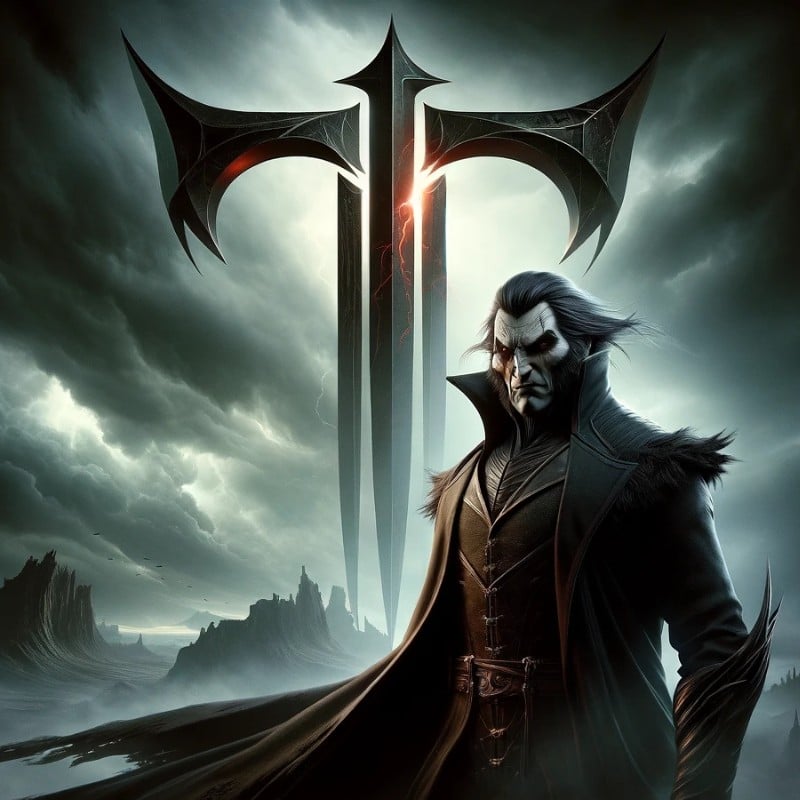
- Tiamat: In Mesopotamian mythology, Tiamat is a primordial goddess of the ocean, embodying chaos and later considered a demon in some traditions.
- Typhon: In Greek mythology, Typhon is a massive serpentine monster that challenged Zeus for control of the cosmos.
- Tezcatlipoca: An Aztec deity associated with a wide range of concepts, including the night sky, hurricanes, and war, sometimes depicted as a malevolent trickster.
- Thamuz: An ambassador of Hell and a demon of low degree, associated with the corruption of men and a sower of discord.
- Thoth: While primarily known as the Egyptian god of writing, knowledge, and wisdom, Thoth is sometimes depicted as a manipulative figure in modern fictional works.
- Tartarus: In Greek mythology, Tartarus is both a deity and a place in the underworld where souls are judged and the wicked are punished.
- Trigon: A fictional demon from the DC Universe, often an adversary of the Teen Titans and father to the character Raven.
- Tunrida: A demoness or witch figure in Scandinavian folklore, associated with seduction and the corruption of the human soul.
- Tsukuyomi: In Japanese mythology, Tsukuyomi is the moon god who became estranged from the sun goddess Amaterasu after committing a cruel act, sometimes seen as malevolent.
- Tengu: Supernatural creatures from Japanese folklore, often depicted as bird-like demons or goblins that cause mischief or war.
- Tlaloc: An Aztec god of rain and thunderstorms, but in some narratives, he demands child sacrifices and thus has a malevolent aspect.
- Tommyknockers: In Cornish and Welsh folklore, Tommyknockers are spirits that inhabit mines, sometimes benevolent, warning miners of cave-ins, but also considered mischievous or malevolent.
- Turisas: A war god from Finnish mythology, sometimes invoked for evil purposes or seen as a malevolent force.
- Typhon: A demon associated with the power of whirlwinds and a personification of volcanic forces, often confused with the Greek monster Typhon.
- Tchort: Derived from the Russian word for “black,” Tchort is a black god or demon in Slavic mythology, often equated with the Christian Devil.
U
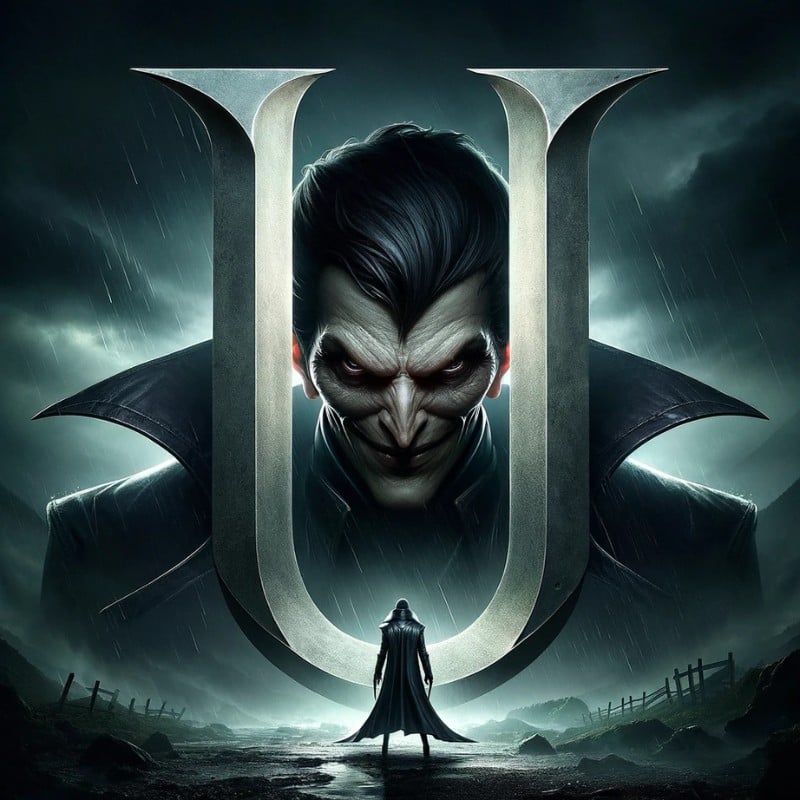
- Ubiquitous: A name that suggests being present, appearing, or found everywhere, which could be used for a character with an all-encompassing presence or influence.
- Umbra: The fully shaded inner region of a shadow cast by an opaque object, especially the area on the earth or moon experiencing the total phase of an eclipse. It can suggest darkness or something that is overshadowed.
- Umbrage: A name that can mean offense or annoyance, but also refers to shade or shadows, suitable for a character who is quick to take offense or operates from the darkness.
- Unctuous: A name that suggests someone who is excessively or ingratiatingly flattering; oily, which can be used for a character who is deceitful and falsely earnest.
- Undertow: A strong current flowing underwater in a different direction to the way the water on the surface is moving, often used metaphorically for an underlying feeling or influence that is contrary to what is apparent.
- Undulate: A name that suggests a smooth, wave-like motion, which can be used for a character with a hypnotic or subtly influential presence.
- Unfathomable: A name that implies something that cannot be fully explored or understood, suitable for a character who is mysterious or inscrutable.
- Unhallowed: A name that suggests something not hallowed or holy; profane; sinful; impious, often used for a place or a character that is desecrated or evil.
- Unkempt: A name that suggests having an untidy or disheveled appearance, which could be used metaphorically for a character who is wild or unrestrained.
- Unseen: A name that implies something not seen or noticed, suitable for a character who operates in secret or is invisible to society.
- Untamed: A name that suggests something wild, not domesticated or cultivated, suitable for a character who is rebellious or uncontrollable.
- Untoward: A name that suggests something unexpected and inappropriate or inconvenient, often used for events or behavior that are ill-favored or perverse.
- Unveil: A name that implies the act of revealing or disclosing something that was previously hidden, which can be used for a character who brings to light secrets or truths.
- Upheaval: A name that suggests a strong or violent change or disturbance, often used for a character who causes revolution or disruption.
- Uproar: A name that signifies a state of commotion, excitement, or violent disturbance, suitable for a character who stirs up chaos.
- Urbane: A name that implies suaveness, courteousness, and refinement, which can be used ironically for a character who is sophisticated on the surface but ruthless underneath.
- Ursine: A name that means bear-like, which can suggest a character with a strong, powerful, but potentially ferocious nature.
- Usurper: A name that suggests someone who takes a position of power or importance illegally or by force, suitable for a character who seizes control or power without right.
- Utilitarian: A name that implies a practical and functional approach, often without regard for the individual, which can be used for a character who values efficiency over morality.
- Utopia: A name that signifies an imagined place or state of things in which everything is perfect, which could be twisted for a character who seeks to create a perfect world at any cost.
- Uxoricide: A name derived from the act of killing one’s wife, which can be used for a character with a dark history or violent tendencies.
V

- Valefar: Also known as Malaphar, Valefar is a Duke of Hell who tempts people to steal and is known for his skill in fraud and deception.
- Vapula: A powerful Great Duke of Hell who commands thirty-six legions of demons, Vapula teaches philosophy and all the mechanical arts.
- Vassago: A Prince of Hell who reveals past, present, and future, discovers hidden and lost things, and commands twenty-six legions of spirits.
- Vepar: A Great Duke of Hell who governs the waters and guides warships, capable of causing the seas to become stormy and to appear full of ships.
- Vetis: A demon who tempts and corrupts the holy, seeking to make them profane and to fall from grace.
- Vine: A King and Earl of Hell who commands thirty-six legions of demons, Vine can discover hidden things, witches, and wizards, and create storms.
- Volac: Also known as Valak or Ualac, Volac is a President of Hell who commands thirty-eight legions of demons and reveals where serpents can be seen.
- Voland: A variant of “Voland” or “Woland,” often identified with the Devil or a demon associated with trickery and cunning.
- Vritra: In Vedic mythology, Vritra is a dragon or serpent, the personification of drought and adversary to Indra, the deity of rain and thunder.
- Vucub-Caquix: A Mayan demon, a bird monster that represents the sin of pride and false gods before the creation of the current world.
- Vanth: In Etruscan mythology, Vanth is a demon of the underworld, often depicted on funerary art and associated with death.
- Vual: A Great Duke of Hell who speaks in ancient Egyptian, seduces women, and procures the love of women for others.
- Vual: Another spelling for Uvall, Vual, or Voval, a demon who is said to be very trustworthy and gives true answers about past, present, and future events.
- Vepar: A demon who governs the waters and can guide armaments of warships, also capable of causing the sea to become rough and stormy.
- Verrine: A demon described as the demon of impatience in some demonological grimoires.
W

- Warlock: A name often associated with a male witch or a magician who uses dark magic, suggesting a character with forbidden knowledge and mystical powers.
- Warp: A name that implies distortion or a twist in something that is typically straight, often used for characters or situations that deviate from the norm.
- Wastrel: A name that suggests someone who wastes their time and resources on extravagance and luxuries, suitable for a character who is reckless and irresponsible.
- Watchman: While traditionally a guard or sentinel, as a name, it can suggest a character who observes from the shadows, possibly with a more ominous role.
- Wendigo: A mythical cannibalistic creature from Algonquian folklore, representing insatiable greed and excess, often associated with winter, the North, and coldness.
- Whisper: A name that suggests soft-spoken or secretive communication, suitable for a character who deals in secrets or operates quietly behind the scenes.
- Wight: An archaic term for a living being or creature, but in fantasy, it often refers to a reanimated corpse or ghostly being, suggesting the undead or a spectral presence.
- Wildcard: A name that suggests unpredictability and the potential to change the outcome of a situation in an unexpected way, often used for a character who is a catalyst for change or chaos.
- Will-o’-the-wisp: A name derived from a phosphorescent light that appears at night over marshy ground, often leading travelers astray, symbolizing deception and elusive goals.
- Wily: A name that implies being skilled at gaining an advantage, especially deceitfully, suitable for a character who is cunning and crafty.
- Winnow: A name that suggests separating out something, often through a sifting process, which can be used metaphorically for a character who separates the good from the bad or the strong from the weak.
- Wisp: A slender, slight, or fleeting form, often associated with something delicate or transient, which can be used for a character who is elusive or ethereal.
- Witchdoctor: A name that suggests a traditional healer or one who uses charms and spells to cure ailments, which can be twisted for a character who engages in darker forms of magic.
- Wither: A name that implies decay, decline, or shrinkage, often used for characters or forces that cause deterioration or sap vitality.
- Wrath: A name that signifies intense anger, often used for characters who embody vengeance or uncontrolled rage.
- Wraith: A name that suggests a ghost or ghostlike image of someone, especially one seen shortly before or after their death, evoking a sense of the spectral and haunting.
- Wreak: A name that implies causing a large amount of harm or damage, suitable for a character who is a force of destruction.
- Wrest: A name that suggests forcibly pulling something from a person’s grasp or the act of twisting or distorting, often used for characters who take what they want by force.
- Writhe: A name that implies twisting or contorting the body, often in pain or struggle, which can be used metaphorically for a character who is in turmoil or is torturous by nature.
- Wyrm: An archaic term for a dragon or serpent, often associated with destruction, wisdom, or ancient power, suitable for a character with a formidable presence or connection to primal forces.
X
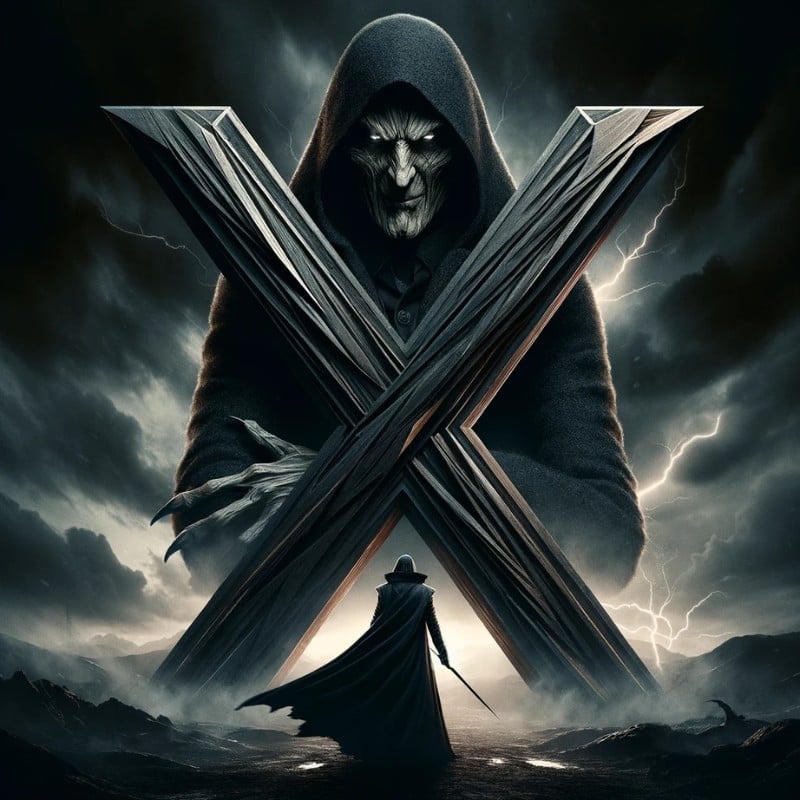
- Xaphan: A demon in Christian demonology who joined Satan’s rebellion against Heaven and is now a demon of the second order, known for stoking the flames of Hell with his mouth and hands.
- Xezbeth: A demon associated with lies and legends, often invoked in the context of telling falsehoods and creating illusions.
- Xolotl: In Aztec mythology, Xolotl is the god of lightning and death, associated with monstrous dogs and often depicted as a malevolent figure.
- Xtabay: A malevolent spirit in Maya folklore, the Xtabay is a seductive woman who lures men to their demise.
- Xiuhcoatl: An Aztec fire serpent, associated with destruction and often considered a weapon of the sun god, Huitzilopochtli.
- Xiangliu: In Chinese mythology, Xiangliu is a nine-headed snake monster associated with floods and destruction.
- Xing Tian: A headless giant from Chinese mythology who fights against the supreme deity, often seen as a symbol of rebellion and persistence in the face of defeat.
Y

- Yam: In Canaanite mythology, Yam is the god of the sea and rivers and is often depicted as a deity with a violent, destructive nature.
- Yama: In Hinduism and Buddhism, Yama is the god of death who presides over the resting place of the dead. While not evil per se, he is often feared.
- Yamata-no-Orochi: A monstrous eight-headed and eight-tailed dragon from Japanese mythology, slain by the storm-god Susanoo.
- Yan-gant-y-tan: A demon from Brittany folklore who wanders the night holding five candles on his five fingers, leading travelers astray.
- Yekun: In demonology, Yekun is a fallen angel who taught men the evil “resolutions of the stars,” leading them astray.
- Yen-lo-Wang: In Chinese mythology, the ruler of the fifth floor of Hell, a judge who presides over the dead, determining their punishments.
- Ysbaddaden: A giant and the primary antagonist in the Welsh mythological story of Culhwch and Olwen, known for his malevolence and opposition to the hero.
- Yaldabaoth: In Gnostic cosmology, Yaldabaoth is a false god or demiurge, often depicted as a lion-faced serpent and associated with materiality and the imperfect world.
- Yezer Ha-Ra: In Jewish belief, the Yezer Ha-Ra is the personification of the evil inclination within every human being, constantly tempting them to give in to their base desires.
- Yog-Sothoth: A cosmic entity from H.P. Lovecraft’s Cthulhu Mythos, Yog-Sothoth knows all and sees all but is usually indifferent to human concerns unless summoned.
- Yuki-onna: A spirit or yokai in Japanese folklore, the Yuki-onna (Snow Woman) appears as a beautiful woman in snowy landscapes and is associated with deathly cold.
Z

- Zealot: A name that suggests fervor for a person, cause, or object; eager desire or endeavor; enthusiastic diligence, often with connotations of fanaticism.
- Zenith: The time at which something is most powerful or successful, in celestial terms, the point in the sky directly above an observer. It can imply a character who is at the peak of power or influence.
- Zephyr: A name derived from the Greek god of the west wind, suggesting a gentle, mild breeze. It can be used for a character with a calm, soothing presence or one who brings change subtly.
- Zero: A name that suggests the absence of any quantity or magnitude; it can imply nothingness or the potential to reset or start anew.
- Zest: A name that signifies spirited enjoyment or eagerness, which could be used ironically for a character who is enthusiastic about less savory activities.
- Zeus: The king of the gods in Greek mythology, associated with the sky, lightning, and thunder, representing a powerful and authoritative figure.
- Ziggurat: An ancient Mesopotamian temple tower consisting of a lofty pyramidal structure built in successive stages with outside staircases and a shrine at the top, suggesting ancient mysteries or a layered personality.
- Zodiac: A name that refers to the circle of twelve 30° divisions of celestial longitude that are centered upon the ecliptic, often associated with astrology and celestial influence.
- Zombie: A name that suggests a reanimated corpse brought back to life by mystical means, such as witchcraft, often used for a character who is mindless or controlled by another.
- Zone: A name that can imply a region or area set apart for a particular purpose, which could be used for a character who is associated with a specific domain or activity.
- Zephyr: A name derived from the Greek god of the west wind, suggesting a gentle, mild breeze. It can be used for a character with a calm, soothing presence or one who brings change subtly.
- Zircon: A mineral belonging to the group of nesosilicates, its name can be used for a character who is strong, enduring, and multifaceted.
- Zodiac: A name that refers to the circle of twelve 30° divisions of celestial longitude that are centered upon the ecliptic, often associated with astrology and celestial influence.
- Zombie: A name that suggests a reanimated corpse brought back to life by mystical means, such as witchcraft, often used for a character who is mindless or controlled by another.
- Zone: A name that can imply a region or area set apart for a particular purpose, which could be used for a character who is associated with a specific domain or activity.
- Zygomorphic: In botany, this term refers to flowers that have bilateral symmetry, with only one plane of division. As a name, it could suggest a character with two distinct sides or aspects to their nature.
